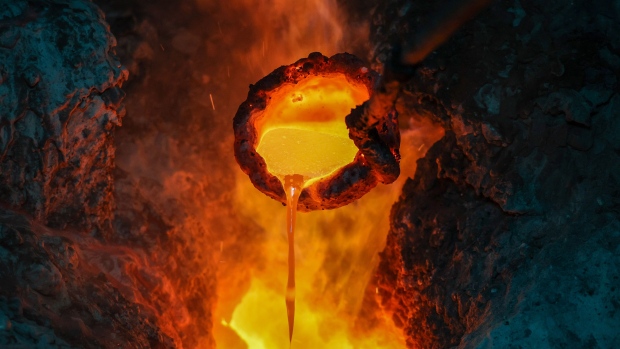Oct 23, 2023
Rusal Secures Alumina Supplies With Rare Russian Deal in China
, Bloomberg News

(Bloomberg) -- Russian aluminum giant United Co. Rusal International PJSC agreed to buy a 30% stake in a Chinese alumina plant to plug a gap in supplies of the key ingredient amid disruptions triggered by the invasion of Ukraine.
The deal with Hebei Wenfeng New Materials Co. marks a rare, direct investment by a Russian firm in China’s metals sector, and the first significant foreign acquisition by a major Russian company since the war began. Rusal will “gain access to alumina at a competitive cost and secure its key raw-material supply,” it said in a filing.
The Russian firm will pay Wenfeng 1.91 billion yuan ($261 million) for the 30% share. The final price will be adjusted based on Wenfeng’s working capital and debt, but isn’t expected to top 2.5 billion yuan.
Commodity markets continue to feel the shock waves from Russia’s attempt to overpower Ukraine — both in terms of raw-materials prices as well as corporate decisions — even with the assault well into its second year. As the combatants have become bogged down, China has continued to offer economic and diplomatic support to Moscow, while the US and EU have backed up Kyiv.
Rusal has grappled with a shortage of alumina for its smelters amid the fall-out from the 2022 invasion. It lost control of a Ukrainian alumina refinery, while Australia banned exports of the semi-processed material to Russia.
Privately owned Wenfeng owns and operates an alumina refinery with annual capacity of 4.8 million tons of metallurgical-grade material in Hebei. As Rusal and the Chinese firm will share output according to their stakes, Rusal will potentially get about 1.4 million tons a year from the acquisition.
China Focus
Russia’s reliance on China has reached into every facet of its economy since the invasion. With the West severing trade ties, China’s exports to Russia have jumped 57% this year. Asia accounted for 33% of Rusal’s revenue in the first half, topping Europe for the first time, according to Rusal.
China’s purchases of processed Russian aluminum hit an all-time high for a third month in September, according to customs data. The world’s second-largest economy is the biggest producer and consumer of the lightweight metal, a key material needed for packaging and manufactured products.
Russia now accounts for about 80% of China’s total imports of the metal. Although that’s just a fraction of China’s production, which is at record levels, booming demand from the renewable sectors is helping keep demand firm.
Hebei Wenfeng New Materials started commercial operation last year and registered net profit of 281 million yuan for the year to Dec. 31. The audited net asset value of the Chinese firm as at end-2022 was approximately 2.9 billion yuan, according to the statement, which didn’t break out the smelter’s debt.
The alumina smelter was controlled by Hebei Wenfeng Industrial Group Co., a privately owned conglomerate which businesses span from steel-making to manufacturing to pharmaceutical, according to the group company’s website.
Hebei Wenfeng New Materials started commercial operation last year and registered net profit of 281 million yuan for the year to Dec. 31. The audited net asset value of the Chinese firm as at end-2022 was approximately 2.9 billion yuan, according to the statement, which didn’t break out the smelter’s debt.
The alumina smelter was controlled by Hebei Wenfeng Industrial Group Co., a privately owned conglomerate which businesses span from steel-making to manufacturing to pharmaceutical, according to the group company’s website.
--With assistance from Alfred Liu and James Poole.
(Updates with details, background from fourth paragraph.)
©2023 Bloomberg L.P.






